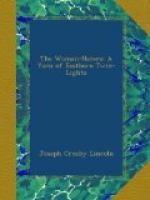After he had gone, and Brown had finished clearing away and the other housekeeping tasks which were now such a burden, the substitute assistant went out to sit on the bench and smoke. The threatened easterly wind had begun to blow, and the sky was dark with tumbling clouds. The young man paid little attention to the weather, however. All skies were gloomy so far as he was concerned, and the darkest day was no blacker than his thoughts. Occasionally he glanced at the bungalow, and on one such occasion was surprised to see a carriage, one of the turnouts supplied by the Eastboro livery stable, roll up to its door and Mrs. Bascom, the housekeeper, emerge, climb to the seat beside the driver, and be driven away in the direction of the village. He idly wondered where she was going, but was not particularly interested. When, a half hour later, Ruth Graham left the bungalow and strolled off along the path at the top of the bluff, he was very much interested indeed. He realized, as he had been realizing for weeks, that he was more interested in that young woman than in anything else on earth. Also, that he had no right—miserable outcast that he was—to be interested in her; and certainly it would be the wildest insanity to imagine that she could be interested in him.
For what the lightkeeper might say or do, in the event of his secret being discovered, he did not care in the least. He was long past that point. And for the breaking of their solemn compact he did not care either. Seth might or might not have played the traitor; that, too, was a matter of no importance. Seth himself was of no importance; neither was he. There was but one important person in the whole world, and she was strolling along the bluff path at that moment. Therefore he left his seat on the bench, hurried down the slope to the inner end of the cove, noting absently that the tide of the previous night must have been unusually high, climbed to the bungalow, turned the corner, and walked slowly in the direction of the trim figure in the blue suit, which was walking, even more slowly, just ahead of him.
It may be gathered that John Brown’s feelings concerning the opposite sex had changed. They had, and he had changed in other ways, also. How much of a change had taken place he did not himself realize, until this very afternoon. He did not realize it even then until, after he and the girl in blue had met, and the customary expressions of surprise at their casual meeting had been exchanged, the young lady seated herself on a dune overlooking the tumbling sea and observed thoughtfully:
“I shall miss all this”—with a wave of her hand toward the waves—“next week, when I am back again in the city.”
Brown’s cap was in his hand as she began to speak. After she had finished he stooped to pick up the cap, which had fallen to the ground.
“You are going away—next week?” he said slowly.
“We are going to-morrow. I shall remain in Boston for a few days. Then I shall visit a friend in the Berkshires. After that I may join my brother in Europe; I’m not sure as to that.”




